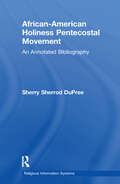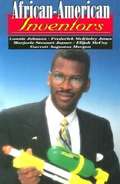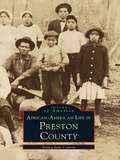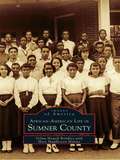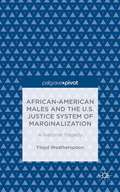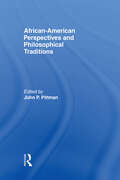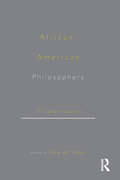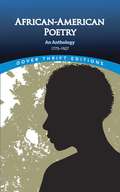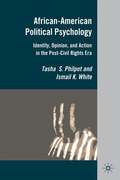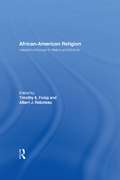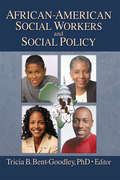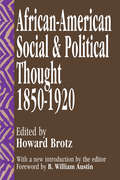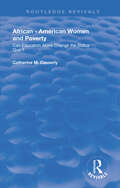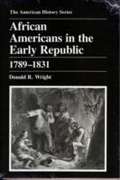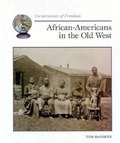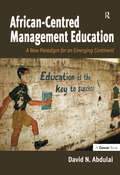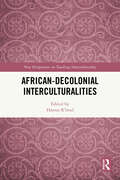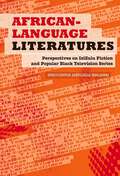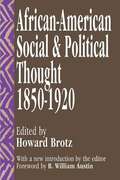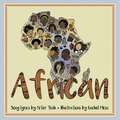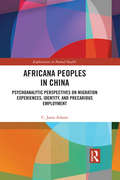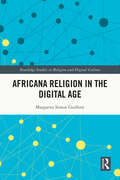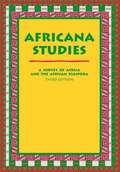- Table View
- List View
African-American Holiness Pentecostal Movement: An Annotated Bibliography (Religious Information Systems #4)
by Sherry S. DuPreeFirst Published in 1996. Those of us who aspire to know about the black church in the African-American experience are never satisfied. We know so much more about the Christian and church life of black Americans than we did even a dozen years ago, but all the recent discoveries whet our insatiable appetites to know it all. That goal will never be attained, of course, but there do remain many conquerable worlds. Sherry Sherrod DuPree set her mind to conquering one of those worlds. She has persisted, with the results detailed here. A huge number of items are available to inform us about Holiness, Pentecostal, and Charismatic congregations and organizations in the African-American Christian community.
African-American Inventors: Lonnie Johnson, Frederick Mckinley Jones, Marjorie Stewart Joyner, Elijah Mccoy, Garrett Augustus Morgan
by Fred M. B. AmramProvides biographical profiles of five African American inventors including Lonnie Johnson, Frederick McKinley Jones, Marjorie Stewart Joyner, Elijah McCoy, and Garrett Augustus Morgan.
African-American Life in Preston County (Images of America)
by Nancy Jane CopneyPreston County, an area nestled in the northern corner of West Virginia, is bounded on the north byPennsylvania and the Mason-Dixon line and on the eastby the state of Maryland. This scenic Appalachian region is primarily a farming community, though mining, timber, recreation, and tourism have also been vital contributors to the county's economy. The small yet vibrant African-American community of Preston County, whose story is told here through family photographs, documents, and memories, is a vital part of the county's heritage. For generations, these families have worked on the land and in the mines; they have raised their children and built their homes in Preston County. Vintage images from as early as the 1860s preserve theAfrican-American story of the mothers and fathers andthe mine workers and farmers who have played andcontinue to play an important role in the history of this beautiful part of the world.
African-American Life in Sumner County
by Mary Huddleston Malone Velma Howell BrinkleyEarly African Americans in Sumner County, both slaves and free, left a legacy not only of beautiful brick buildings and sturdy stone fences, but also a social history as rich and varied as the many tribes they represented. This exciting book is an invaluable resource for anyone interested in the immeasurable contributions, undeniable services, and the devotion of black Americans to the evolution of Sumner County's communities. Many of the sienna-hued photographs and Civil War-era tintypes presented here were taken when folks wore their Sunday best and didn't smile for the camera. These images, many never before published, capture everything from a "creek baptism" and bonnet worn by a local slave, to views of families and schoolchildren. The volume covers most of the early settlements in Sumner County where African Americans largely resided, fromRockland and Avondale to Scattersville, Parker's Chapel, and Gallatin.
African-American Males and the U.S. Justice System of Marginalization: A National Tragedy
by Floyd WeatherspoonThis book provides an overview of the economic and social status of African-American males in America which continues to deteriorate at an alarming rate.
African-American Perspectives and Philosophical Traditions
by John P. PittmanFirst published in 1997. Routledge is an imprint of Taylor & Francis, an informa company.
African-American Philosophers: 17 Conversations
by George YancyAfrican-American Philosophers brings into conversation seventeen of the foremost thinkers of color to discuss issues such as Black existentialism, racism, Black women philosophers within the academy, affirmative action and the conceptual parameters of African-American philosophy.
African-American Poetry: An Anthology, 1773-1927 (Dover Thrift Editions)
by Joan R. ShermanIn the 19th century, abolitionist and African-American periodicals printed thousands of poems by black men and women on such topics as bondage and freedom, hatred and discrimination, racial identity and racial solidarity, along with dialect verse that mythologized the Southern past. Early in the 20th century, black poets celebrated race consciousness in propagandistic and protest poetry, while World War I helped engender the outpouring of African-American creativity known as the "Harlem Renaissance."The present volume spans this wealth of material, ranging from the religious and moral verse of Phillis Wheatley Peters (ca. 1753-1784) to the 20th-century sensibilities of Langston Hughes and Countee Cullen. Also here are works by George Moses Horton, Frances Ellen Watkins Harper, Alberry Alston Whitman, Henrietta Cordelia Ray, Daniel Webster Davis, Mary Weston Fordham, James Weldon Johnson, Paul Laurence Dunbar, and many more.Attractive and inexpensive, this carefully chosen collection offers unparalleled insight into the hearts and minds of African-Americans. It will be welcomed by students of the black experience in America and any lover of fine poetry.Includes 4 selections from the Common Core State Standards Initiative: "I, Too, Sing America," "Lift Every Voice and Sing," "Yet Do I Marvel," and "On Being Brought from Africa to America."
African-American Political Psychology
by Tasha S. Philpot Ismail K. WhiteThis volume addresses questions such as: How do the unique experiences of Blacks in America influence their political psychology? What are the psychological mechanisms underlying Blacks' orientation toward politics and can these mechanisms help account for observed differences in Black political attitudes and behavior?
African-American Religion: Interpretive Essays in History and Culture
by Albert J. Raboteau Timothy E. FulopAfrican American Religion brings together in one forum the most important essays on the development of these traditions to provide an overview of the field.
African-American Social Workers and Social Policy
by Carlton Munson Tricia Bent-GoodleyCritical analyses of policies that significantly affect African-American families and communities! African-American Social Workers and Social Policy is the first book of its kind to combine the voices of African-American social work professionals on social policy in one volume. You'll learn about the impact of health, child welfare, and aging, the implications of welfare reform, and the harsh statistics about race and imprisonment from respected practitioners in the field. Each chapter ends with recommendations for policy advocacy, giving you the tools you need to help reform the system. The issues addressed in African-American Social Workers and Social Policy include: how proposed Social Security reforms can help or hinder efforts to bridge the wealth gap the role of grandparents as caregivers the implications of child welfare policies, including the Multi-Ethnic Placement Act of 1994 the effects of race, class, and gender discrimination on African-American women's health the significance of the Human Genome Project how social workers can stand up to the biases of the criminal justice system African-American Social Workers and Social Policy also presents an eye-opening review of the history of mental health policies for African Americans and an action agenda focused on knowledge and empowerment as a solution to pervasive institutional racism. This book is a welcome forum for policy educators, advocates, and those committed to social justice. You will value African-American Social Workers and Social Policy for its clear identification of issues, thorough analysis of the social policy arena and its impact, and comprehensive description of new goals, directions, and possibilities. This book will help you better understand vital social policies that affect African Americans today.
African-American Social and Political Thought: 1850-1920
by Howard Brotz B.William AustinIn bringing together the most characteristic and serious writings by black scholars, authors, journalists, and educators from the years that preceded the modem civil rights movement, 'African-American Social and Political Thought' provides a comprehensive guide to the range and diversity of black thought. The volume offers a deep history of how the terms of contemporary debate over the future of black Americans were formed. The writings assembled here reveal a tension and a thread between two essential poles of thought. These include those voices that clearly projected civic assimilation as the goal of black aspiration, and those who described how this aim would be achieved, as well as nationalist or separatist voices that despaired of ever having a dignified future in a biracial society. These two positions reflect the most fundamental questions faced by any minority group. In his forceful and courageous introduction to this new edition, Howard Brotz relates the thoughts and reflections of these black thinkers to the social and political situation of blacks in America today and argues against the political orthodoxy and sociological determinism that perpetuates the image of the black as a perennial and passive victim. In the scope and quality of its contents, African-American Social and Political Thought is a unique, invaluable source book for cultural historians, sociologists, and students of black history.
African-American Women and Poverty: Can Education Alone Change the Status Quo?
by Catherine M. CasserlyIn the United States, public policies designed to reduce poverty are overwhelmingly influenced by human capital theory, since education is viewed as the powerful mechanism by which productivity will increase, incomes will be raised, and economic opportunity will be provided. Although African-American women followed the prescription set forth by human capital theory and increased their educational attainment by over 2 years from the late 1960s to the late 1980s, their incidence of poverty remained fairly stable. First published in 1998, this study examines why educational investments by that population most susceptible to being poor, African- American females, have not reduced poverty as expected.
African-American/Afro-Canadian Schooling
by Charles L. GlennTracing the history of black schooling in North America, this book emphasizes factors in society at large - and sometimes within black communities - which led to black children being separate from the white majority. In African-American/Afro-Canadian Schooling: From the Colonial Period to the Present , Charles L. Glenn reveals the evolution of assumptions about race and culture as applied to schooling, as well as the reactions of black parents and leadership in the United States and Canada.
African-Americans in the Early Republic, 1789-1831
by Donald R. Wright"This is a study of African Americans in the early republic, which, as it is defined here, is the time beginning with Washington's inauguration in 1789 and ending with Nat Turner's rebellion in 1831." Other books in the American History Series are available from Bookshare.
African-Americans in the Old West (Cornerstones of Freedom)
by Tom McgowenDescribes the important role of freed slaves and other African-Americans in the settlement of the Western US.
African-Atlantic Cultures and the South Carolina Lowcountry
by Ras Michael BrownAfrican-Atlantic Cultures and the South Carolina Lowcountry examines perceptions of the natural world revealed by the religious ideas and practices of African-descended communities in South Carolina from the colonial period into the twentieth century. Focusing on Kongo nature spirits known as the simbi, Ras Michael Brown describes the essential role religion played in key historical processes, such as establishing new communities and incorporating American forms of Christianity into an African-based spirituality. This book illuminates how people of African descent engaged the spiritual landscape of the Lowcountry through their subsistence practices, religious experiences, and political discourse.
African-Centred Management Education: A New Paradigm for an Emerging Continent
by David N. AbdulaiIn African-Centred Management Education, Professor Abdulai looks critically at the failings of management education in Africa and how that has impacted growth and development efforts, especially at this critical stage in the continent’s positive growth and development trajectory. He concludes that Africa’s current positive economic growth cannot be sustained without a significant contribution from its human capital. He adds that, the outstanding economic record of Asian economies in recent decades dramatically illustrates how important human capital is to growth. These countries lacking natural resources and importing practically all their energy requirements have grown rapidly by relying on a well-trained, educated and conscientious workforce. Professor Abdulai believes that Africa, too, can sustain its current growth and development by effectively combining its abundant natural resources with its human capital to attain its economic development, but this will require an African cadre of well-trained managers at the helm of both private and public sector institutions. For this to become a reality, management education in Africa will have to play a significant role, but the author argues that it cannot be effective by continually mimicking the West in the programmes it delivers. It must come up with innovative and relevant pedagogy that will address the special challenges that the continent faces and deliver an African-centred management education. As well as pointing to the failures of management education in Africa, Abdulai offers suggestions as to how to make management education really contribute to the education of Africans, in order to sustain current and future development.
African-Decolonial Interculturalities (New Perspectives on Teaching Interculturality)
by Hamza R’boulThis groundbreaking book brings together scholars to explore African epistemologies as underrepresented and misrepresented sociologies of knowledge in interculturality research, challenging dominant narratives and promoting epistemic justice.The volume affirms the validity of African perspectives based on their originality and non-derivativeness rather than their status of invisibility. It contributes to a critical reflection on how African spheres and epistemologies can be represented and ultimately understood as homogeneous entities, denying the particularities of their situated acts and processes of knowing. The contributors argue that (a) theorizing and practicing interculturality otherwise requires 'looking elsewhere' by foregrounding knowledge from spheres often marginalized by dominant mainstream discourses; (b) African stories, discourses, and epistemologies are crucial for enunciating interculturality through innovative and original knowledge and thus advancing the field. The book aims to promote diverse African interculturalities, strengthen alternative theorization methods, and position interculturality as a theory of hermeneutics and liberation that African people can draw upon to navigate and understand their own and others’ experiences.This book will be essential read for scholars and students of intercultural communication, sociology, African studies, and philosophy.
African-Language Literatures: Perspectives on isiZulu fiction and popular black television series
by Innocentia Jabulisile MhlambiAfrican-language writing is in crisis. The conditions under which African writing developed in the past (only remotely similar to those of Western models), resulted in an inability of Eurocentric literary models to explore the hermeneutic world of African language poetics inherited from the oral and the modern worlds. Existing modes of criticism in the study of this literary tradition are often unsuited for a nuanced understanding of the intrinsic and extrinsic aspects at play in the composition, production and reading of these literatures. In African-Language Literatures, Innocentia Jabulisile Mhlambi charts new directions in the study of African-language literatures generally and isiZulu fiction in particular by proposing that African popular arts and culture models be considered as a logical solution to current debates and challenges. Mhlambi shows how the popular arts and culture approach brings into relationship the oral and written forms, the local and the international, and elitist and popular genres, and locates and places the resultant emerging, eclectic culture into its socio-historical context. She uses this theoretical approach to explore – in a wide range of cultural products – what matters or what is of interest to the people, irrespective of social hierarchies and predispositions. It is her contention that, in profound ways the African-language literary tradition evinces diversity, complexity and fluidity, and that this should be seen as an invitation to look at systems of meaning which do not hide their connections with the facts of power and material life.
African-american Social And Political Thought: 1850-1920
by Howard Brotz B. AustinIn bringing together the most characteristic and serious writings by black scholars, authors, journalists, and educators from the years that preceded the modem civil rights movement, African-American Social and Political Thought provides a comprehensive guide to the range and diversity of black thought. The volume offers a deep history of how the terms of contemporary debate over the future of black Americans were formed. The writings assembled here reveal a tension and a thread between two essential poles of thought. These include those voices that clearly projected civic assimilation as the goal of black aspiration, and those who described how this aim would be achieved, as well as nationalist or separatist voices that despaired of ever having a dignified future in a biracial society. These two positions reflect the most fundamental questions faced by any minority group. In his forceful and courageous introduction to this new edition, Howard Brotz relates the thoughts and reflections of these black thinkers to the social and political situation of blacks in America today and argues against the political orthodoxy and sociological determinism that perpetuates the image of the black as a perennial and passive victim. In the scope and quality of its contents, African-American Social and Political Thought is a unique, invaluable source book for cultural historians, sociologists, and students of black history.
African: A Children's Picture Book (LyricPop #0)
by Peter ToshAn AALBC Recommended New Book! Included in Publishers Weekly's Children's Galleys to Grab at Winter Institute! A beautiful children's picture book featuring the lyrics of Peter Tosh's global classic celebrating children of African descent. So don't care where you come from As long as you're a black man, you're an African No mind your nationality You have got the identity of an African African is a children's book featuring lyrics by Peter Tosh and illustrations by Jamaican artist Rachel Moss. The song "African" by Peter Tosh was originally released in 1977 on his second solo record, Equal Rights. He wrote the song during a time of civil unrest in Jamaica as a reminder to all black people that they were part of the same community. The album is considered one of the most influential reggae works of all time. A key song from the classic 1970s era of reggae Peter Tosh was one of the founding members of the iconic reggae group the Wailers
Africana People in China: Psychoanalytic Perspectives on Migration Experiences, Identity, and Precarious Employment (Explorations in Mental Health)
by C. Jama AdamsThis book examines the psychosocial experiences of foreign workers from Africa and its diaspora in China, within the context of international socio-economic forces. By exploring employment-based migration from a psychoanalytic perspective, this volume investigates the utility of adaptive ambivalence and the challenges that migrant workers face around issues of self-development, agency, and identity. Through a careful analysis of interviews with Africana people, the author demonstrates that the capacity to be reflective and resilient alongside having a strong and diversified support network are crucial for the psychological well-being of those living and working in unfamiliar geographic and cultural conditions.
Africana Religion in the Digital Age (Routledge Studies in Religion and Digital Culture)
by Margarita Simon GuilloryThis book diversifies the fields of digital religion studies and Africana religious studies by considering the nuanced intersections between digital technologies and the religious experiences of African Americans. While Christianity is a continuous marker of religious identity for many African Americans, this digital approach to examining Africana religion in the US uncovers other non-Christian esoteric traditions that have often been marginalized within academia. The book explores the diverse ways that African Americans employ the Internet, social media, human enhancement technologies, and gaming to construct multidimensional modes of religious identities. It also considers the ways that Africana religious practitioners employ digital platforms to both complement and disrupt religious authority. Ultimately, the book establishes Africana religious experiences as viable entry points in the scholarly engagement of religion in the digital age. As such, it will be a key resource for scholars of Religious Studies, Africana Religious and Esoteric Studies, Religion and Culture and Religion and Sociology.
Africana Studies: A Survey Of Africa And The African Diaspora
by Mario AzevedoThe third edition of Africana Studies: A Survey of Africa and the African Diaspora is an update of the second edition (1998) and incorporates new chapters that include expanded coverage of issues on women, health, terrorism, the African Union, and many others, as well as the most recent theories and methods in Africana studies. To date, Africana Studies remains the most comprehensive and most suitable text for both teachers and students interested in Africa and the Diaspora in the US, the Caribbean, Afro-Latin-America, and elsewhere. The book is divided into five parts: the state of the art of Africana studies; the evolution of the history of black people; analysis of the contributions of the black world; the present and future status of these peoples; and the societies and values of black people. The book also includes a chronology of significant events in the history of peoples of African descent and a number of maps.
